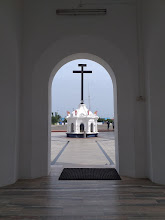Good things happen to bad people.
Bad things happen to good people.
Or perhaps, as age settles in, good and bad simply happen — to old people.
Some call it harmless, but I think it is a quiet injustice that the Aarya Vepu — the noble neem — is now unwelcome in many Christian premises. Once a familiar, healing presence, it is now replaced with trees of little purpose. In the fierce summers of our land, when the skin cracks and the soul grows restless, the neem’s shade was a balm. Its breeze was not only cool but medicinal, a living blessing.
But now we plant പാഴ് മരങ്ങൾ — barren trees, soulless ornaments.
Who will speak for nature when even memory begins to forget?
Long ago, in a different land, giants walked among men.
The Anakim were among them — a race of great size and strength, descendants, it was said, of the Nephilim, those ancient offspring of fallen angels and mortal women. It was a bloodline cursed by heaven itself, a remnant of a time when the boundaries between earth and the divine were recklessly crossed.
God judged the fallen angels harshly; their children, the Anakim, remained — living in the hill country of Canaan.
When Joshua led the Israelites into Canaan, it was said he waged war against the Anakim, driving them out and destroying many. Yet some escaped and found refuge in a city called Gath — one of the last strongholds of their kind.
Generations later, from Gath came Goliath, the giant who defied Israel and fell to the sling of young David. Goliath, and perhaps his brothers, were the lingering echoes of a forgotten race, remnants of a war that stretched back to myth and mystery.
It is worth remembering: the Philistines, who lived in that land during David’s time, were themselves newcomers — migrants from distant shores of the Mediterranean. Like Joshua’s people, they too were not the original children of the soil.
History, like memory, is never as simple as we like to believe.
Here, in our own land, when Western medicine was rare and costly, our grandfathers revered the neem — Azadirachta indica — for its healing powers. Its leaves, bark, and breath were our shield against sickness, our answer to summer's cruelty.
Now, we forget.
We forget the sacred tree that gave without asking.
We forget that refuge is not always something we build — sometimes it is something that grows.
And the land, like a patient giant from forgotten days, waits in silence under the merciless sun.


